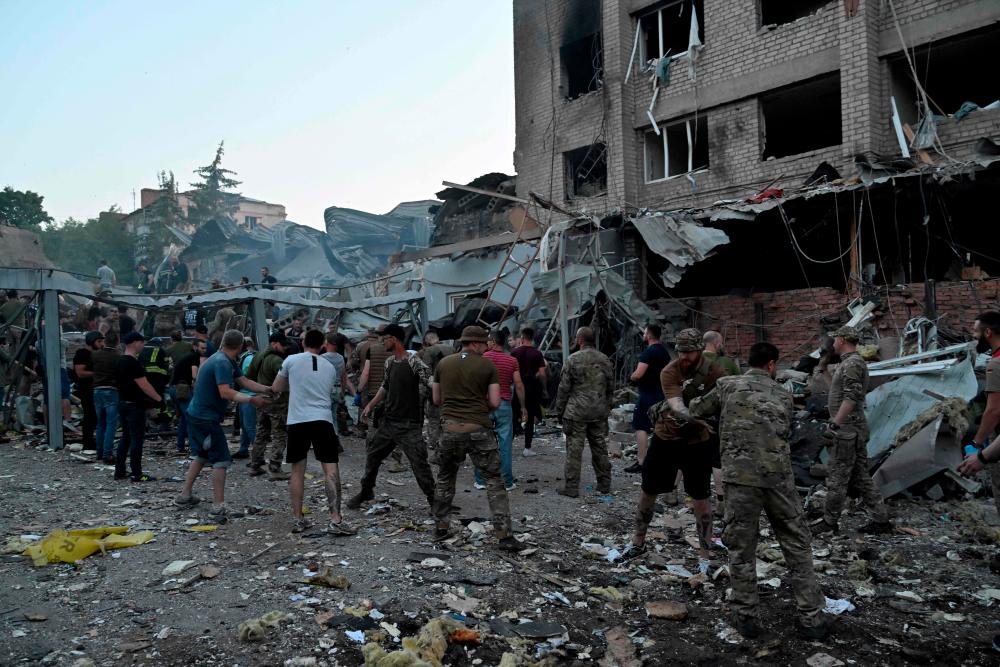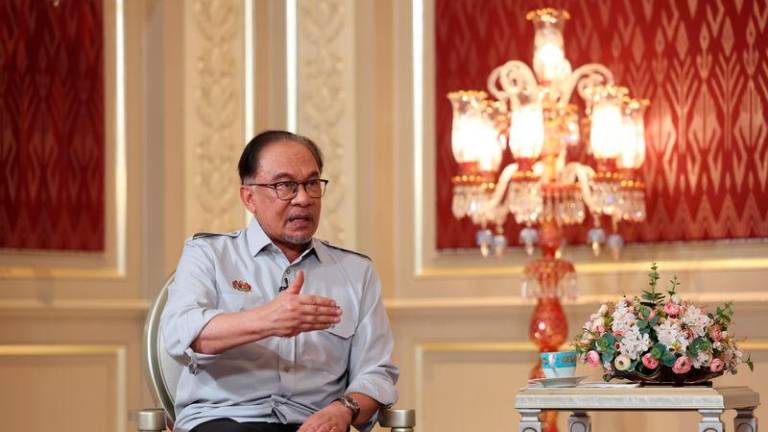KRAMATORSK: The death toll from a Russian missile strike on a restaurant in eastern Ukraine rose to 11 on Wednesday, including children, as the Kremlin insisted Russian forces only hit military-linked targets.
The latest tragedy came as German Chancellor Olaf Scholz said Russian President Vladimir Putin had been weakened by the Wagner mercenary group's mutiny but that the ultimate consequences of the rebellion remained unclear.
Three children were among the dead and at least 56 people were injured in the strike on the Ria Pizza restaurant in the town of Kramatorsk.
The eatery was popular with soldiers and journalists in one of the largest towns still under Ukrainian control in the east.
“The bodies of 11 people, including three children, have been pulled out of the rubble, 56 people were injured, including one child,“ Ukraine’s emergency services said on social media.
- 'Horrible and very sad' -
Ukraine has arrested a person who coordinated the attack, President Volodymyr Zelensky said. “Whoever helps Russian terrorists to destroy lives deserves the maximum penalty,“ Zelensky said in his evening address to the nation.
Military doctor Galyna said she was near the restaurant when it was struck.
“We were in an apartment and we heard an explosion,“ she said, adding there were numerous injured inside.
“It’s horrible and very sad, but I am not surprised that a missile arrived here. It was a place where you could come and have a delicious lunch and coffee.
“I myself have sat there more than once.”
But Moscow maintained that it only targeted military facilities in Ukraine.
“Strikes are only carried out on objects that are in one way or another linked to military infrastructure,“ said Kremlin spokesman Dmitry Peskov.
“The Russian Federation does not carry out strikes on civilian infrastructure,“ he added.
- 'Pariah around the world' -
Days after Wagner head Yevgeny Prigozhin’s aborted rebellion -- widely seen as the biggest threat to Kremlin authority in decades -- Germany’s Scholz said it would “surely have long-term consequences in Russia”.
“It shows that the autocratic structures, the power structures, have cracks and he in no way sits as firmly in the saddle as he always claims,“ Scholz told public broadcaster ARD.
“But I don’t want to take part in speculation about how long he’ll stay in office -- it could be a long time or short, we don’t know.”
In Washington, US President Joe Biden said it was too early to tell whether Putin had been weakened by the Wagner group's aborted rebellion.
“It’s hard to tell,“ Biden told reporters Wednesday. “But he’s clearly losing the war” in Ukraine and “he’s losing the war at home.”
Putin is now “a pariah around the world,“ Biden added in brief remarks.
In a meeting with the head of the southern Russian province of Dagestan, parts of which were aired on state television, Putin on Wednesday said that he “didn’t doubt” that he had the support of Russians during the mutiny.
- 'A potential threat' -
A feud between Wagner and the Russian army had escalated for months, with Prigozhin making increasingly scathing statements against the generals' handling of the offensive in Ukraine, blaming them for thousands of Russian losses.
According to a Wall Street Journal report Wednesday, Prigozhin aimed to detain the heads of the Russian military in the mutiny, but they discovered his planned rebellion early and avoided capture.
Kyiv has said the mutiny's influence on fighting was minimal.
“Unfortunately, Prigozhin gave up too quickly. So there was no time for this demoralising effect to penetrate Russian trenches,“ Ukrainian Foreign Minister Dmytro Kuleba told CNN in a video published Wednesday.
The bloody conflict is now 16 months old, with mass casualties on both sides and a rising civilian toll.
A day after Belarus welcomed Prigozhin into exile, Polish President Andrzej Duda warned the presence of Wagner troops in the Moscow-allied neighbour could pose a potential threat to the region.
“It is difficult for us to exclude today that the presence of the Wagner Group in Belarus could pose a potential threat to Poland, which shares a border with Belarus, a threat to Lithuania... as well as potentially to Latvia,“ Duda told reporters during a visit to Kyiv.
Lithuania said Wednesday it had bought two Norwegian-made NASAMS air defence launchers for Ukraine and would deliver them within three months. -AFP










